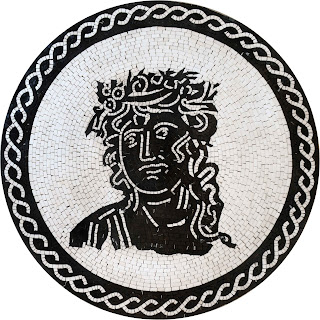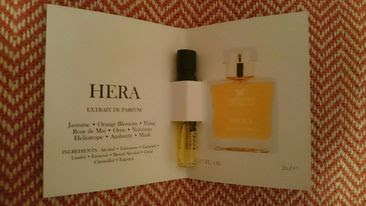 |
| Source: protestantedigital.com |
When a little package landed on the floor the other day with a sample vial of Hera, the latest creation by Liz Moores of Papillon Perfumery (due for release on 16th May), it could not have come at a better time. For I have been in a bit of a "mood tunnel" lately, a reference to a recent episode of the Daily Trip, one of the guided meditation series in the vast compendium of "mental health interventions" that is the Calm app. ;) For anyone not familiar with it, it also includes sleep stories, a library of soothing music and ambient sounds, self-help podcasts, masterclasses in useful topics on everything from stoicism to screen addiction (you may need the former if you are trying to give up the latter), and is peppered with pithy aphorisms for just about every occasion. In this particular episode, the author/presenter of the Daily Trip series, Jeff Warren, talked about how some days "everything seems awesome!", while other days "everything sucks" (insert "seems great" and "is s**t" for English sensibilities). The thing I wanted to mention from this talk on moods is the takeaway that once you realise you are in a mood tunnel, that very acknowledgement of the fact means it loosens its hold over you...
A key reason for the tunnel may warrant a post of its own, for I have been doing a ton of research recently into so-called "nutraceutical" remedies to try to fix a new - and irritatingly recurrent - skin condition on my face (seborrheic dermatitis: the third in an unholy trinity of facial eczema varieties I have acquired), and I may just have chanced upon one or two things that are making a difference.
But anyway, I mention all of that by way of scene setting: the perfume's arrival was perfectly timed, and its ability to switch up my mood instant.
Turning first to the inspiration behind Hera, this latest addition to the Papillon stable was originally conceived as a wedding scent (and "auspicious amulet") for Liz's eldest daughter Jasmine, who graciously allowed her mother - after a decent interval! - to release the scent publicly as part of the Papillon line. Indeed it will be the last release for the foreseeable future, while Liz takes a well earned break.
Without delay, here are the notes of Hera, including jasmine as a fragrant nod to its eponymous wearer:
Jasmine, orange blossom, ylang, rose de mai, orris, narcissus, heliotrope, ambrette, musk
The significance of Liz's choice of the name Hera for the perfume may be inferred by readers brought up on Greek mythology, namely that she was the "protector of women, presiding over marriages and births". I also discovered that Hera is "commonly seen with animals she considers sacred, including the cow, the lion and the peacock". Well, Jasmine being her mother's daughter is almost certainly going to be able to rustle up a companion menagerie comprising pretty much any combo of animals - now also including some quite big and scary spiders! - though these have probably been annexed by the goddess Arachne already...(Oh, I just noticed that one of Liz's spider family is in fact called Arachne - "no flies on her", hehe...not least because they've all been eaten.)
Other surprising things I learnt about Hera are the fact that she was both the wife and sister of Zeus, a rather cosy arrangement not typically replicated in modern marriages, and that she reportedly had frequent fights with Zeus over his affairs and illegitimate children. I love the euphemistic use of the word "recourse" in the following quote from Liquisearch:
"The legitimate offspring of her union with Zeus are Ares (the god of war), Hebe (the goddess of youth), Eris (the goddess of discord) and Eileithyia (goddess of childbirth)...Hera was jealous of Zeus' giving birth to Athena without recourse to her (actually with Metis), so she gave birth to Hephaestus without him. Hera was then disgusted with Hephaestus' ugliness and threw him from Mount Olympus. In an alternate version, Hera alone produced Hebe after being impregnated by a head of lettuce or by beating her hand on the Earth, a solemnizing action for the Greeks."
 |
| Source: dasil.ca |
I am still reeling from the lettuce reference, the practicality of whose use as an artificial inseminator strikes me as most implausible. Anyway, the moral of all this is that with Greek myths it pays not to delve too deeply; the Olympian crew were a pretty rum bunch, as further detailed in this bizarre and startling post by a travel insurance company, presumably in a bid to drum up package holiday sales to Greece. It turns out that Hera's father / father-in-law Cronus swallowed his own children whole, such that it is frankly a miracle Zeus and she ever made it to adulthood.
But enough of these delinquent deities, how does Hera the fragrance smell, you may well ask?
Well, I have tried it three times now: on the first go the perfume opened with a sunny bouquet of sultry flowers with a juicy undertow, thanks to a piquant spike of ylang. Then quite quickly a muted powdery cloud passed over the sun and stayed there for the rest of the perfume's development, with the sensuous floral notes peeking through here and there like a box of wriggling kittens. On the second two samplings, the perfume went more or less straight to the cloud cover stage with no discrete bright opening. I should point out that my skin greatly amplifies musk and heliotrope in every scent I have ever tried with those notes in, and it seems that with Hera too, it has a tendency to grab the basenotes from the off. And ambrette is in itself a type of musk, as I understand it, so the entire base of the scent happens to be what I tend to magnify at the expense of the rest of the composition. I would LOVE to do a wrist-to-wrist comparison with someone whose skin showcases the brighter florals for longer, as they are a gorgeous assortment.
Which is not to say that the iris-ambrette-musk accord is not very beautiful in itself, as it really is, and there is zero hint of the dreaded "laundry musk" that spoils so many modern perfumes for me, even before the magnification issue. Nor can I take a lot of heliotrope in more vintage compositions - as in L'Heure Bleue, for example, or Les Parfums de Nicolai Sacrebleu, both of which made me slightly queasy. In Hera the accord comes off as a really delicate, perfectly blended, wistful trail, with no note more prominent than the rest - which is no mean feat when heliotrope is in the mix. And for anyone who is not a massive fan of iris, which I guess I am not really, this isn't an overtly iris scent that tips into Chanel No 19 territory. Rather it is the cloud behind which I mostly only glimpse the brighter notes, so they are damped down by the iris and it by them, as it were. Yes, this impeccably tasteful composition hovers quiveringly between a sensuous summer floral and a powdery high end boudoir scent: it happens to skew more towards the latter on me, but your olfactory mileage may well vary, so please do give it a whirl.
 |
| Source: mosaico.com |
The original image that popped into my head when I first smelt Hera and caught more of the floral notes was that of "a vintage sundress with staves", to convey the summery vibe of the opening counterbalanced by the formality of the drydown; in the end though I decided that a sundress was too casual a garment, even one reinforced by bits of metal. I would also describe Hera as a "cheerier Apres L'Ondee", of which there are echoes in the base. I could definitely have featured Hera in my "Careless Whispers" series of scent reviews if I was still keeping it up, as it would fit right into that category. But in the end I have gone with my "nasal nutraceutical" image, to mark the fact that I was in my mood tunnel and Hera gave me a jolly good shunt along it. Then I teamed it with that of a Grecian gown, though from memory Jasmine's actual wedding dress was a fabulous black sequined fishtail number.
In short, Hera is fantastically understated and sophisticated, and "Juno what, it may be my favourite Papillon scent yet!", which as a big fan of Bengale Rouge I don't say lightly.
